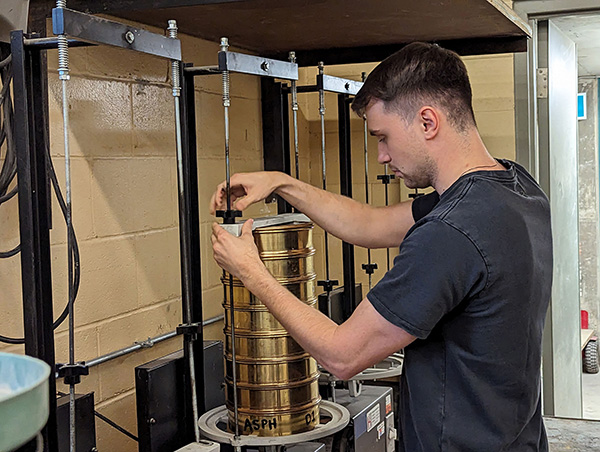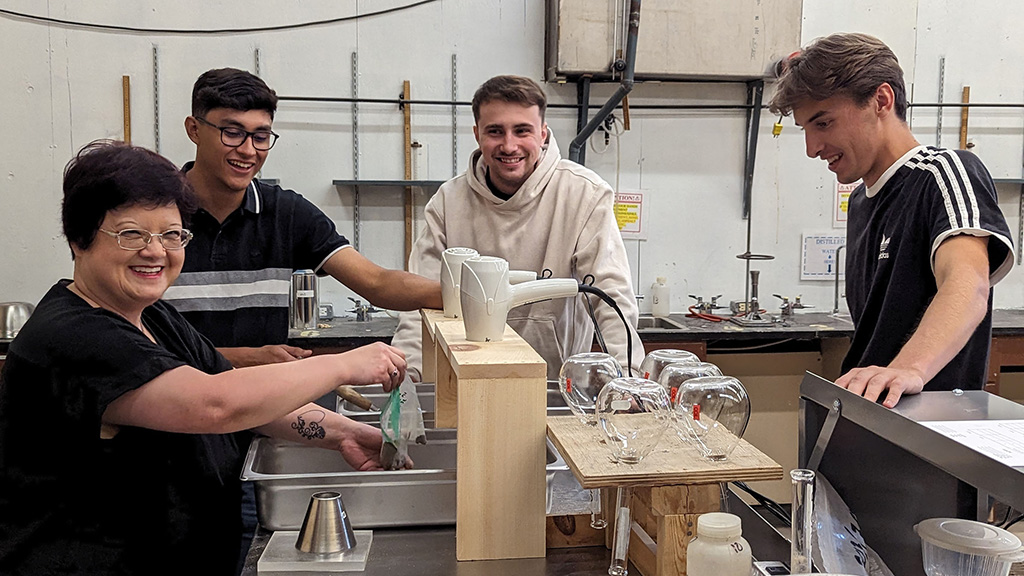Three Mohawk College civil technology students, their professor and a technologist might be considered trailblazers in the field of academic construction material testing following a major achievement by the college and those five individuals.
In October, the Hamilton, Ont.-based college became the first Canadian post-secondary institution to receive aggregate certification from a national testing body. It is now certified by the Canadian Council of Independent Laboratories (CCIL) for industry testing.
Certification was approved after a long application and review process which included a CCIL inspection of the college’s reorganized and updated materials laboratory in August.
The five people who were certified as part of the process are Building and Construction Sciences professor Irene Amog, building and construction sciences technologist Tyler Scott Sowden, and civil technology students Tyler Thiem, Oscar Padron Janica and Evan Weidner.
Their certifications are valid for five years, while the laboratory’s certification has to be renewed every two years, say Amog.
“Now that we have a certified lab we can work with the construction industry and introduce our students to the reality of construction material testing and how it impacts any project,” she says.
The materials laboratory is used in the civil engineering program to help students obtain hands-on practical experience to better understand the theory of various types of construction materials, such as aggregate, concrete and asphalt.

As part of that learning, they test materials and analyze the data they have collected by comparing it to various specifications, such as the Ontario Provincial Standards for Roads and Public Works, she says.
“But all this practical lab experience has been based on strictly hypothetical scenarios.”
With certification now in place, the laboratory will be moving away from those scenarios “into a reality where students can hopefully appreciate the importance of material testing.”
The origins of how and why the college decided to pursue certification and the steps required to obtain it was not straightforward. It started in about 2021 when the college’s associate dean asked Amog if she was interested in research.
“I was intrigued with this idea, but before I gave my answer, I sent out a survey to multiple companies in the construction industry asking if there was any interest in working with Mohawk College in research projects,” she explains.
For the most part, the survey respondents were very positive and actually raised questions on why Mohawk College students were not getting CCIL certified prior to their first co-op. Many of those students, for their co-op, typically work in a lab or out-in-the-field testing materials, she says.
A Mohawk graduate with more than 25 years of experience in the construction materials industry, she knew the laboratory had to be certified for test results and findings to be viable and accepted.
And anyone working on a research project in a certified laboratory must also be certified. That is why, once the college made the commitment to seek certification, Amog, Sowden and the three students decided to pursue that goal.
“They (the students) volunteered,” said Amog, when asked why they specifically were chosen.
There were numerous targets that had to achieved, both in terms of the physical transformation of the laboratory and the applicants’ preparation.
It was process that began in November 2022, “when we were still trying to figure out how this (certification) was going to work in the laboratory.”
At that time, 70 per cent of the space was being used for classes and the remainder for storage, she says.
As part of the planned transformation, a new layout was designed to illustrate how the laboratory could be reorganized so it could function for both classes and the research.
In January of this year a civil technologist student was hired to conduct an inventory of the lab equipment and determine the working condition of each one.
In April a major renovation got underway and any “items not being used, not needed, or broken” were disposed of to create needed floor and workspace.
While that work was underway, Amog completed a quality manual, which was a certification requirement, and Sowden performed a number of tasks such as calibrating the laboratory equipment.
As for the individual certifications, it was a two-stage process. Amog and the others first had to pass written tests based on their knowledge and understanding of the various aggregate clauses of the Ministry of Transportation, Laboratory Standards, Laboratory Testing Manual, MTO LS-2023.
Then, in August, during the assessment of the laboratory by CCIL inspector Tammy Hawkins, they had to complete a series of manual exercises such as compaction testing.
Asked how often testing will be conducted in the laboratory, Amog says it will depend on agreements between the college and its industry partners. She certainly believes the construction industry will be a beneficiary.
“I think any employer, whether they are aggregate producers, asphalt, or concrete producers, would want a level of comfort that the co-op students or graduates they hire are familiar with testing methods and understand what the test results mean.”



Recent Comments
comments for this post are closed